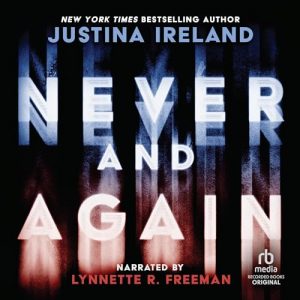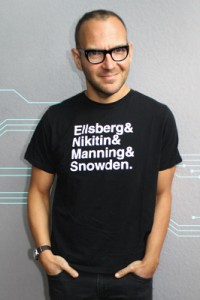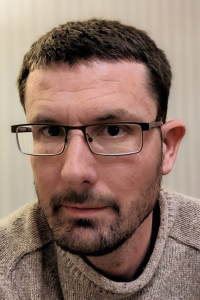Justina Ireland: Art Isn’t Safe

 JUSTINA IRELAND was born in French Camp CA, and grew up in San Bernadino and outside Sacramento. After graduating high school, she joined the Army, got married, and later settled in Pennsylvania with her husband before eventually moving to Maryland.
JUSTINA IRELAND was born in French Camp CA, and grew up in San Bernadino and outside Sacramento. After graduating high school, she joined the Army, got married, and later settled in Pennsylvania with her husband before eventually moving to Maryland.
Her first novel, Vengeance Bound, a YA fantasy about a girl with a psychic link to the Furies, appeared in 2013, followed by YA fantasy Promise of Shadows (2014). YA paranormal thriller Girl Reaper was serialized online by fiction app INKLO in 2017. Other YA novels include Ophie’s Ghosts (2021) and Rust in the Root (2022). Her YA Civil War-era zombie novel Dread Nation (2018) was followed by sequel Deathless Divide (2020).
Middle-grade series Devil’s Pass includes Evie Allen vs. the Quiz Bowl Zombies (2017), Jeff Allen vs. the Time Suck Vampire (2017), Tiffany Donovan vs. the Cookie Elves of Destruction (2017), Zach Lopez vs. the Unicorns of Doom (2017), Tiffany Donovan vs. the Poison Werewolves (2018), and Zach Lopez vs. the Shadow Cats (2018). She also writes Star Wars tie-in fiction.
Ireland was executive editor of quarterly magazine FIYAH from 2016–2018, and won a World Fantasy Award with co-editor Troy L. Wiggins for their work in 2018.
Her latest books include YA romantic fantasy Chaos & Flame (2023), co-written with Tessa Gratton, and audio original military SF novel Never and Again (2023).
Excerpt from the interview:
“Sometimes women or feminine writers do unfairly get labeled as YA because we get dismissed, and people push our things to the side: ‘This doesn’t matter because, obviously, it was written for teenagers.’ Eye roll. I do think there’s a problem there. But, for me, when I read a book, there’s a lot of times where I’m like, ‘This voice could have put it in YA, until…’ Sometimes, it’s just that the language is uncomplicated – adult writers tend to use their big five-dollar words. But when I sit down and write a story, I just write a story. I’ve gotten notes back – especially on the Star Wars side of things, for middle-grade – that say, ‘This word is too complicated for middle-grade readers. I’m like, ‘They got the Google! They can google it – they can learn something.’ This doesn’t usually happen on my personal side because my editor is like, ‘Yeah, kids need to learn.’
“When you’re outside of publishing, and especially when you’re trying to break in, the categories feel so streamlined and efficient and very black-or-white. Then, once you’re inside the soup, you realize it’s a soup, right? Things merge into one another, and what is middle-grade this week might be YA next week, and what is adult this week might be YA next year. Then we get into the crossover stuff, and people tried to start that New Adult thing ten years ago. Everyone’s like, ‘What ever happened to New Adult?’ It never happened. Actually, I redact that – it did happen, but it was mostly a self-published moment for romance writers.
“Never and Again is about a near future where there’s been a never-ending war, because war is one of my favorite topics to talk about. It’s narrated from the POV of an analyst – not an actual soldier – who is reiterating what has happened to a soldier. It’s intrusive second person, but the characters exist in the book, as well, in alternating chapters. It’s a second-person chapter, and then a first-person chapter, so, they’re basically telling you, ‘Hey this is what happened to you,’ and then they’re pulling back into the bigger world. It’s really a logical extension of the arguments that we have right now politically, like, ‘What happens if there’s not birthright citizenship? What happens if there’s another pandemic or food scarcity? What’s the next version of NAFTA if the US, Canada, and Mexico decide to absorb into one another? What does that look like? What happens when people who control the purse strings control the messaging?’ All that stuff. And what happens when we are irresponsible with our technology?
“One of the things that always fascinates me is how few people know that so much of our modern technology had military applications first. The internet was a military application first, and now we all get to look at cat pictures. And cell phones and GPS, right? My husband still works for the Department of Defense, so when they’re talking about the next generation of stuff, I’m like, ‘Yeah, that’s going to be the next thing we wear on our wrists.’ Drones are an example. We love drones, they’re so fun! But they were used to kill people in the Middle East – let’s not divorce those things from their original intent. It’s important for us, as people – especially if you are on the liberal side of the political scale – to remember that. As a military veteran who’s also a liberal, it bothers me when people are like, ‘Ah, I don’t want to think about war, it’s gross, I’m antiwar.’ Great! You can be antiwar, but it’s still going to exist, and you need to be able to fight for things like veteran’s benefits after people come back from war. What happens when half of your population is walking around with PTSD? Not to mention that people from marginalized backgrounds tend to serve a lot more because the military is a way out of whatever situation they’re living in. It’s how the system is designed. I always tell folks, ‘You know how you can tell you’re in the bad part of town? Because there’s a recruiting station at the mall.’ The mall that has the Apple Store and Louis Vuitton doesn’t have a US Army recruiting station. We have to think about the world as more than just our own comfortable space. We have to be of the world, and sometimes that means the dirty, gross parts, too.
“Never and Again is an audiobook original because of the rejections I got on the print side. My original editor was just not good for it. That was just me – ‘This is not a good fit, this is not a good relationship.’ That’s on me, because I do think writers, at a certain point, are responsible for knowing the editors they are working with. But a lot of the rejections I got were like, ‘This is great, but I don’t know how to sell this.’ I don’t know if that’s because women writing military fiction doesn’t happen, or if it’s because the military fiction we get has such a strong colonization, pro-war bent. Or maybe it’s that people just don’t want to read military fiction now, which is fair, because we’re literally coming out of so many wars. We’ve had two decades of almost nonstop warfare, even if it’s fit into the background. But, it is what it is.
“Never and Again was probably the book that’s the most personal for me, and that’s where I always get in trouble with writing – the personal stuff. I can joke, I can shoot the shit, I can talk about stuff all day, but then when I start to dig into the personal stuff, the stuff that hits home, the open wounds in my heart, the things that left bruises on me – those are the things that are always really, really hard. There’s a book title taken from a slave narrative, They Left Great Marks on Me, and it’s about the violence Black women experienced during slavery and the things that they endured. I just think about that: the things that leave great marks on us. That’s where our greatest writing comes from, and our greatest storytelling comes from, but it’s also the hardest stuff to write. In Dread Nation and Deathless Divide, when Jane is trying to figure out how to be friends with Katherine, that was the hardest part to write because I don’t know if I’ve necessarily always been a good friend. I’ve always enjoyed having friends, but I’m very flakey and I can get distracted by shiny shit. That was really hard to explore: ‘What does it mean to be a good friend? What are the expectations there? How do you accept the grace that people give you when you think you’re not worthy of that grace?’
“I have a middle-grade book coming out May next year. It takes place in a trailer park, and I grew up in a trailer park, and those scenes were really hard to write, because I was excavating those childhood memories. Everyone’s like, ‘Do you do therapy?’ No, but I probably should. We all should, but I write books instead. It takes me a while to get through things, but when I do, I always know: ‘Wow that’s a really strong scene. That works.’ That’s why there are always a lot of difficult mother-daughter relationships in my books, because moms are difficult, and being a mom is difficult – it’s hard on either side. The personal stuff always sings. When people say, ‘Can I write about this culture I don’t belong to?’ I’m like, ‘Why would you?’ The stuff you can write from your own personal experience is always going to sound stronger on the page than the stuff you made up because you cobbled together other people’s narratives. This is why when people are worried about AI, all writers know that AI isn’t a threat to good writing – it’s a threat to serviceable writing. There’s a big difference between being a good writer and a serviceable writer.”
Interview design by Francesca Myman.
Read the full interview in the September 2023 issue of Locus.
 While you are here, please take a moment to support Locus with a one-time or recurring donation. We rely on reader donations to keep the magazine and site going, and would like to keep the site paywall free, but WE NEED YOUR FINANCIAL SUPPORT to continue quality coverage of the science fiction and fantasy field.
While you are here, please take a moment to support Locus with a one-time or recurring donation. We rely on reader donations to keep the magazine and site going, and would like to keep the site paywall free, but WE NEED YOUR FINANCIAL SUPPORT to continue quality coverage of the science fiction and fantasy field.
©Locus Magazine. Copyrighted material may not be republished without permission of LSFF.






